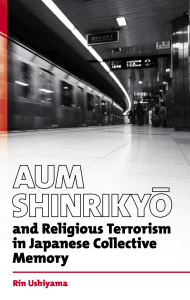Aum Shinrikyō and Religious Terrorism in Japanese Collective Memory (2022, Oxford: Oxford University Press)
‘Drawing on a remarkably wide range of evidence, Ushiyama sets out a definitive account of a famous modern Japanese tragedy. The book exposes many fundamental aspects of Japan at the present time, while being much more than simply a study of that country alone.’ – David Inglis, Professor of Sociology, University of Helsinki
‘In examining how the Aum Affair has shaped Japan’s collective memory, Ushiyama not only sheds light on the nature of contemporary Japan but provides theoretical insights into wider theories about social memory and responses to trauma.’ – Ian Reader, Professor Emeritus, University of Manchester
‘This is a story well worth telling – and, indubitably, well worth reading.” – Eileen Barker, Professor Emeritus, London School of Economics
“The book really reads like a story. I was constantly eager to know how the plot would continue. This is especially commendable when taking into account that Ushiyama studies a wide variety of actors, each with their own perspectives on the event.” – Social Forces
“Ushiyama’s informative and well-articulated work is a valuable contribution to contemporary religious studies that encourages reflection and further scholarly dialogue.” – Nova Religio
About the Book
Aum Shinrikyō’s sarin attack on the Tokyo subway in March 1995 left an indelible mark on Japanese society. This is the first book to offer a comprehensive study of the competing memories of Aum Shinrikyō’s religious terrorism. Developing a sociological framework for how uneven distributions of power and resources shape commemorative processes, this book explores how the Aum Affair developed as a ‘cultural trauma’ in Japanese collective memory following the Tokyo attack. Interrogating an array of sources including mass media reports and interviews with victims and ex-members, it reveals the multiple clashing narratives over the causes of Aum’s violence, the efficacy of ‘brainwashing’ and ‘mind control’, and whether capital punishment is justified. It shows that although cultural trauma construction requires the use of moral binaries such as ‘good vs. evil’, ‘pure vs. impure’, and ‘sacred vs. profane’, the entrenchment of such binary codes in commemorative processes can ultimately hinder social repair and reconciliation.
